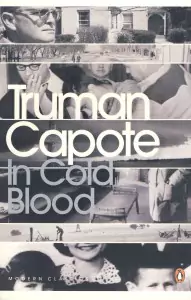 Truman Capote’s novel In Cold Blood, published in 1966, is one of the most prominent examples of the “new journalism” literary genre. It tells the story of the murder of Gregory Clutter and his family, committed by two former convicts: Perry Smith and Richard Hickock. Truman Capote based his story on real life events, and thus all characters in his novel were non-fictional. Capote managed to uncover the psychology of the two mass murderers through interviews with them and with other figures of this grim case, and depicted complex motives that pushed Smith and Hickock towards committing the crime.
Truman Capote’s novel In Cold Blood, published in 1966, is one of the most prominent examples of the “new journalism” literary genre. It tells the story of the murder of Gregory Clutter and his family, committed by two former convicts: Perry Smith and Richard Hickock. Truman Capote based his story on real life events, and thus all characters in his novel were non-fictional. Capote managed to uncover the psychology of the two mass murderers through interviews with them and with other figures of this grim case, and depicted complex motives that pushed Smith and Hickock towards committing the crime.

✅ AI Essay Writer ✅ AI Detector ✅ Plagchecker ✅ Paraphraser
✅ Summarizer ✅ Citation Generator
The novel starts with a description of Herbert Clutter, a farmer from a small town of Holcomb, Kansas. He is a respected self-made man, and everyone in town likes him and his family: his wife Bonnie, who suffers from some sort of depression, and his two children, Kenyon and Nancy. Clutter’s two other elder daughters are married and live in other cities. Clutter is a member of the Methodist church—he is known as a fair man of conservative outlook.
One day, Susan Kidwell, a young woman from Clutters’ neighborhood, visits their house and finds Nancy Clutter lying dead in her room. When the police arrives, they find the bodies of Bonnie, Kenyon, and Herbert Clutter; all of them were tied with ropes and shot by a shotgun. No evidence was found at the crime scene; however, after processing the photos from Clutter’s place, detective Alvin Dewey, who is in charge of the investigation, notices several footsteps in one of the pictures. This remains the main evidence for a rather long period of time; Dewey and his team do titanic work, checking any version of how the crime was committed and any suspect, talking to locals, and trying to reconstruct the events of November 15, 1959, when the Clutter family was murdered.
At the same time, Capote depicts the life of Perry Smith and his friend Richard “Dick” Hickock. Though Capote does not directly accuse them of murder, by hints it becomes clear to the reader that Smith and Hickock are guilty. They travel across the United States, stealing food and performing financial frauds with cash checks. They spend some time in Mexico, then return to the United States. Hickock suggests to return to Kansas City as he has some “friends” there; he plans to extort money from them and then to finally leave Kansas forever.
At the same time, Hickock’s former cellmate Floyd Wells, who had once worked as a hired worker on Clutter’s farm, recalls how he told Hickock about Clutters. Back then, Wells supposed that Clutter’s should have had about $10,000 at home; according to his words, Hickock planned to visit Clutters as soon as he got out of jail. Wells tells his story to detectives; he is assured in Hickock’s guilt, as the murder was committed exactly how Hickock planned to do it.
After visiting Kansas City and successfully passing several more hot checks, Smith and Hickock go to Miami, where they live for some time. Then they go to Las Vegas in a stolen car. Always lacking money, they plan to rob and kill prosperous-looking causal companions, but they do not manage to do it. Instead, in Las Vegas their license plate number is recognized by a policewoman; both criminals are arrested on December 30, 1959. Though they try to plead temporary insanity, they are both found guilty and sentenced to death through hanging. The sentence is executed on April 14, 1965.
Capote, who researched prisoners extensively through interviews, describes the psychology of both Perry Smith and his companion. According to Capote, Perry Smith (whom the author is told to have made friends with), had a tragic fate; three of his siblings (mother, a sister and a brother) had committed suicide. He suffered from a severe mental disorder, supposedly schizophrenia; Smith’s emotional reactions were separated from his consciousness. Hickock, on the other hand, had a relatively safe and happy past, but his character changed after a car accident, when he got head trauma. Since that time, Hickock suffered from partial amnesia and headaches, and displayed a craving for theft. Anyways, difficult pasts and psychological traumas do not save the criminals from being hanged.
Follow us on Reddit for more insights and updates.


Comments (0)
Welcome to A*Help comments!
We’re all about debate and discussion at A*Help.
We value the diverse opinions of users, so you may find points of view that you don’t agree with. And that’s cool. However, there are certain things we’re not OK with: attempts to manipulate our data in any way, for example, or the posting of discriminative, offensive, hateful, or disparaging material.
Comments are closed.